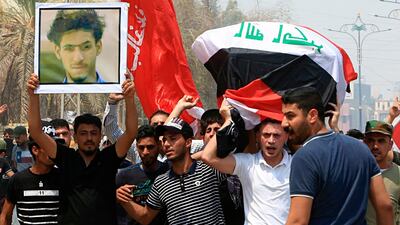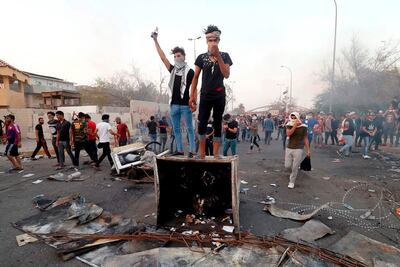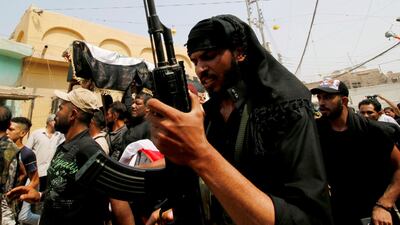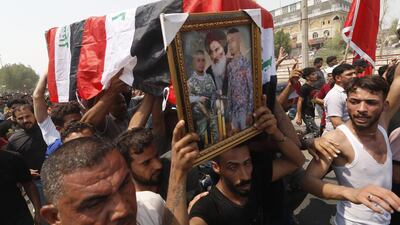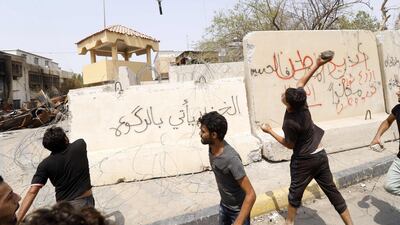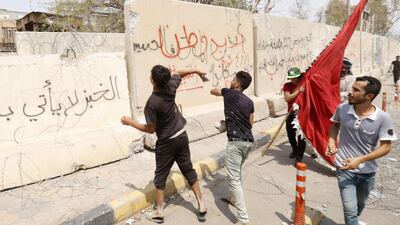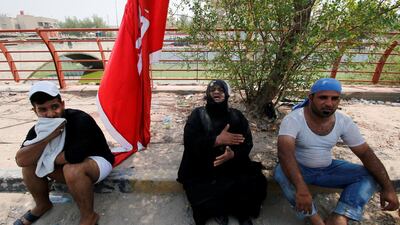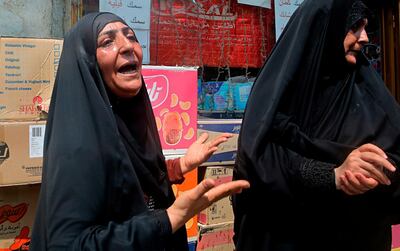Residents of southern Iraq took to the streets again on Tuesday to vent anger at the government's inability to provide basic services, as politicians' squabbling over the formation of the next government delayed the process yet again.
MPs met on Monday for the first time since an inconclusive parliamentary election in May, but decided on Tuesday to adjourn the session until September 15, having failed to elect a new parliament speaker.
Naming a speaker and two deputies is the first major step towards establishing a new government.
The delay is likely to exacerbate an already frail and uncertain political process.
While politicians in Baghdad remain locked in protracted negotiations, civilians in the southern province of Basra suffer the effects of poor services, including polluted drinking water.
"Basra has sacrificed a lot of blood and innocent people's lives so that corrupt politicians can stay in power," Mohamed Al Tai, a former member of parliament for Basra, told The National. He said that Basra city was being led by the same political parties who were quarrelling to take control of the country.
After parliament met on Monday, its temporary leader said it would remain in session until Tuesday. But lawmakers failed to reach a quorum and agreed to return in 11 days.
"Members of parliament are preoccupied in trying to form a government rather than addressing the legitimate demands of the protesters," Sara Allawi, adviser to Vice President Ayad Allawi, told The National. "They are so busy contesting positions rather than addressing the protests."
A coalition between Prime Minister Haider Al Abadi and the populist cleric Moqtada Al Sadr is vying for majority support in parliament, against a union between Hadi Al Ameri, commander of the Iran-backed Hashed Al Shaabi forces, and former prime minister Nouri Al Maliki.
Both claim to have amassed the highest number of MPs.
Mr Al Sadr, whose political bloc won the most seats, portrays himself as a nationalist who rejects both American and Iranian influence, while Mr Al Abadi is seen as America's preferred candidate. Mr Al Ameri and Mr Al Maliki are Iran's two most prominent allies.
The power struggle highlights the considerable divisions within Iraq's Shiite majority and between competing external influences - the US and Iran.
______________
Read more:
Iraqi protesters threaten to invade Basra oilfield
Basra governor wants oil firms to build water plants
Basra health crisis: 17,000 admitted to hospitals for water poisoning
Abadi assumes security post on chaotic first day of new parliament
_______________
Meanwhile, demonstrations in the country's neglected south show now sign of abating.
Protests have swept cities as residents demonstrate against electricity outages during the hot summer, a lack of jobs, proper government services and entrenched graft.
Basra’s health authorities condemned on Tuesday the escalation of violence in the province after hundreds of people mourned the death of a protester in clashes with security forces.
Police used tear gas to disperse protesters after hundreds of people gathered near Basra city's provincial government building on Monday night.
"We are urging against the use of violence," Alaa Hashim, Basra's Health Ministry spokesman, told The National. He said patients with gunshot wounds had been admitted to hospitals.
"The protester Yasser Makki died in hospital and tens more people were wounded in demonstration," Mr Hashim said.
The local head of Iraq's Human Rights Commission, Mahdi Al Tamimi, called for an investigation into Makki's death.
"We call on the Iraqi judiciary to open an immediate and urgent investigation into the killing of a demonstrator who was shot in the shoulder and subjected to electric shocks by security forces," Mr Al Tamimi said.
On Tuesday, mourners carried Makki's body to the site where he was wounded, chanting "Yasser's blood will not be lost".
"What happened to Yasser is a comparison of what Saddam Hussein did to the citizens of Basra in 1991 after the uprising occurred against the dictator," Mr Al Tamimi said.
On Sunday, protesters threatened to break into the Nahr Bin Omar oilfield if the government did not respond to their demands to improve basic services and address their complaints over Basra's drinking water, which residents say is undrinkable because of high salt levels.
"We will not allow the oilfield to operate unless we get clean water. No services, no jobs and now no clean water. We are fed up," said Hassan Ali, a protest organiser.
Officials at the oilfield, operated by state-run Basra Oil Company, said production was running normally. Nahr Bin Omar produces about 44,000 barrels per day, they said.
Basra health officials said more than 17,000 people had been treated for illnesses caused by polluted drinking water in recent weeks.
